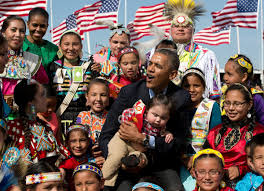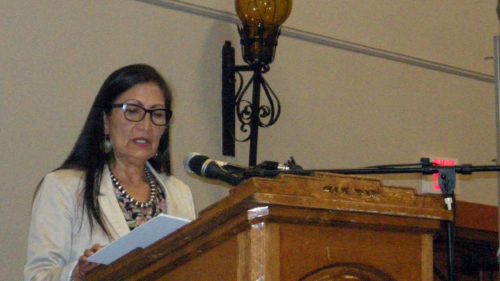Under the Constitution, treaties with tribal nations are part of the supreme law of the land. They establish a unique sets of rights, benefits, and conditions for the treaty-making tribes who agreed to cede millions of acres of their homelands to the United States, in return for recognition of property rights in land and resources as well as federal protections.
Through treaty-making, Indian tribes granted these lands and other natural resources to the United States, while retaining all rights not expressly granted. These retained rights cover a wide variety of subjects, including the right to hunt, fish, and gather resources – including access to traditional plants and animals – both on land the tribes ceded, as well as on land they retained.
However, for much of its history, the Federal Government acted with impunity when dealing with these lands at times violating the very treaties they had sworn to uphold. But this month, in an effort to affirm the federal government’s moral and legal responsibility to protect tribal treaty rights and similar tribal rights, especially those that concern the use of natural resources, the Obama Administration reached an agreement with 567 federally-recognized tribes.
Federal agencies will establish working groups to enhance inter-agency coordination and tribal consultation in developing and implementing land and resource management decisions; and share best practices, tools and resources to identify, understand and analyze tribal treaty rights that can be affected by federal actions. In short, tribal rights, established by treaty, will now become a factor in federal land management decisions.
The federal government has an obligation to honor and respect tribal rights and resources that are protected by these numerous treaties. Integrating consideration of tribal treaty rights and similar tribal rights into agency decision-making processes is consistent with the federal government’s responsibility to federally-recognized tribes.
The New Mexico Wildlife Federation applauds this decision. For too many years Native people have been invisible in land management decisions, despite the fact that the law required them to be part of the process. The New Mexico Wildlife Federation has worked closely with its Native partners to ensure that a tribal voice is heard in land management decisions, and NMWF respects the sovereignty of its Native nation partners. Now that the federal government is also respecting the status of Native people and their treaties, NMWF, tribal allies, and the federal government can stand shoulder-to-shoulder and make the best decisions to hand our lands off to our future generations.
By Todd Leahy, Deputy Director at the New Mexico Wildlife Federation. Todd has a PhD in American Indian History



